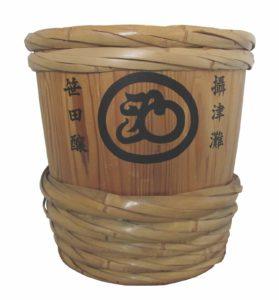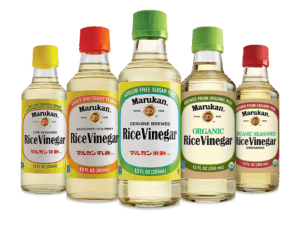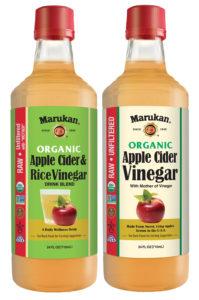The vinegar category is hotter than ever. Whether taken in shots for its perceived health benefits, served as part of a dressing to enhance a classic salad, or incorporated into a post-workout smoothie, consumption continues to grow in both retail and foodservice channels.
Like many popular foods and condiments, chefs and foodies finding new uses and experimenting with flavor combinations make rice and apple cider vinegars seem like the latest hot trend, when, in fact, vinegar has had a place at the table for centuries.
The Egyptians and Babylonians valued its preservative qualities. Ancient Greeks enjoyed drinking a mixture of vinegar, water, and honey. In Japan, vinegar was crafted by master brewers, like Marukan, and valued as the foundation of many Japanese dishes, including sushi.
You Don’t Rush Perfection
Rice vinegar is imperative for the best sushi because its mild flavor seasons the rice and enhances the seafood which it surrounds. Because the first step in creating rice vinegar is fermentation, it’s a process that cannot be rushed. The vinegar is derived from rice alcohol, or sake, the first step in fermentation. The secret to Marukan Rice Vinegar is its signature, slow-brewing, refining and aging process using traditional methods handed down for ten generations of this family-owned company.
Marukan’s rice vinegar has a smoother, more balanced flavor compared to other brands of rice vinegar, balsamic and malt varieties. With its lower acidity, it’s an excellent ingredient in many delicious dishes like shrimp scampi, barbecue chicken, spinach salad and even pumpkin soup.

Established in the city of Kiyosu, located in the Aichi Prefecture of western Japan, Marukan has been producing some of the world’s finest rice vinegars for more than 370 years. In fact, the Marukan name was equated with excellence dating back to 1603 when it was said that “Masumune means sake and Marukan means vinegar”—a statement that was taken so seriously by the company’s founder, Suya Kanzaburo, that his name was written on every barrel to remind buyers of his dedication to the highest quality rice vinegar. The same dedication to excellence led to its eventual commissioning of Marukan as the official purveyors to the Imperial Household and provided rice vinegar to the Imperial Family including Emperor Meiji during the early 20th century.
A Flavor for the Nations
As international travel and immigration grew, Americans fell in love with authentic Japanese cuisine and the rice vinegars that were so integral, not only in sushi, but in sauces, dressings and even beverages. By the early 70s, the popularity of sushi spread inward from the coasts and, in response to consumer demand, Marukan established its U.S. operations in Paramount, California, producing rice vinegar for the North American market.

Today, the company offers a variety of rice and apple cider vinegar products including original Marukan Genuine Brewed Rice Vinegar, a Seasoned Gourmet variety, Lite Seasoned Rice Vinegar, and Organic and Organic Seasoned products. Marukan’s Organic Apple Cider Vinegar products are one of the latest additions, hitting the American market and grocery shelves in 2021.

Rice vinegar, apple cider vinegar and new blends of the two are part of the impetus that continues to drive retail and foodservice sales to new heights. As consumers experience vinegars in sushi, beverages, and other cuisine, they naturally want to recreate these experiences at home. Marukan offers a full line of premium products for both retailers and foodservice channels, to help retailers and chefs take advantage of the popularity of these vinegars to drive profits and repeat business.
Learn more about Marukan’s history at RiceVinegar.com. For retailers and foodservice operators interested in putting the power of Marukan’s heritage and quality to work in their operations, visit www.marukan-usa.com/contact/ to receive a consultation.
